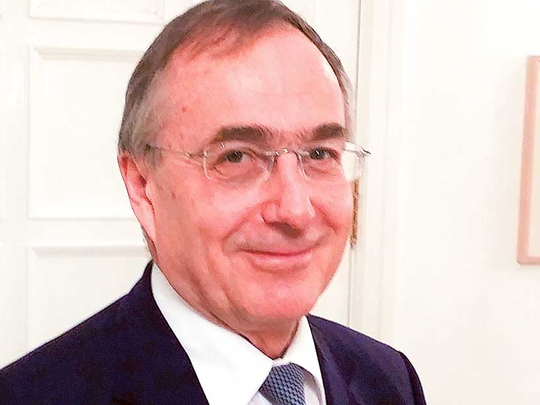
Dubai: University College London (UCL) is celebrating the fact that it has surpassed traditional educational leaders — Oxford and Cambridge Universities — in the UK government’s analysis of research, which will bring £7.5 million (Dh40.84 million) extra funding to UCL taking its total to £131 million annually.
UCL Provost Professor Michael Arthur was in Dubai following up on UCL’s research projects in the UAE, and making contact with the 380 UCL alumni in the country when he spoke to Gulf News, while also finding out more about where the 75 students currently at UCL come from.
“We have two reasons to celebrate,” he said. “The historic news about the research was one, but we also were delighted in November to have a Nobel Prize in Physiology and Medicine when Professor John O’Keefe was honoured for his work on the place cells in the hypocampus part of the brain, which act as the brain’s GPS system and are fundamental to how animals understand how to move around in any space.
“John has been at UCL since 1967 — more than 40 years — so we feel this prize is a real UCL success. We were all walking around with puffed out chests, feeling proud.”
UCL does not run a teaching programme in the UAE, but has an active programme of working with research partners, and Professor Arthur was in the country to look into new areas of activity, and check on existing programmes.
“For example, we are very active with Moorfields Hospital through UCL’s Institute of Ophthalmology which has big benefits for both UCL and the hospital. Here in the UAE, there is a lot of glaucoma surgery which often leads to scarring, and we have techniques on offer for preventing that important problem,” he said.
“Several new projects have come up during this visit,” he said. “We will be working on a project that is being nurtured from the UAE looking at how to manage the poverty-prosperity gap, and we have a new proposal to develop an infectious disease programme. We are also working with corporations to start some training of targeted areas of engineering and other skills in what looks like a win-win for us all.”
A very significant development in London will greatly increase UCL’s presence, said Arthur. “We are due to open a new campus in the Queen Elizabeth Olympic Park on the site of the London Olympics. This new campus will have 50,000 square metres of academic space, and we will be alongside institutions like London’s University of the Arts, Loughborough University, the Victoria and Albert Museum, Sadlers Wells theatre, and the Smithsonian from the US.”
“This is part of a wider plan to build a cluster of intellectual fire power in London that should position the city to rival world leaders like Boston and San Francisco,” said Arthur. “London is the only place in Europe that can achieve this, with universities like Oxford, Cambridge, Kings, Imperial and others all close by and able to contribute and drive London forward.”








